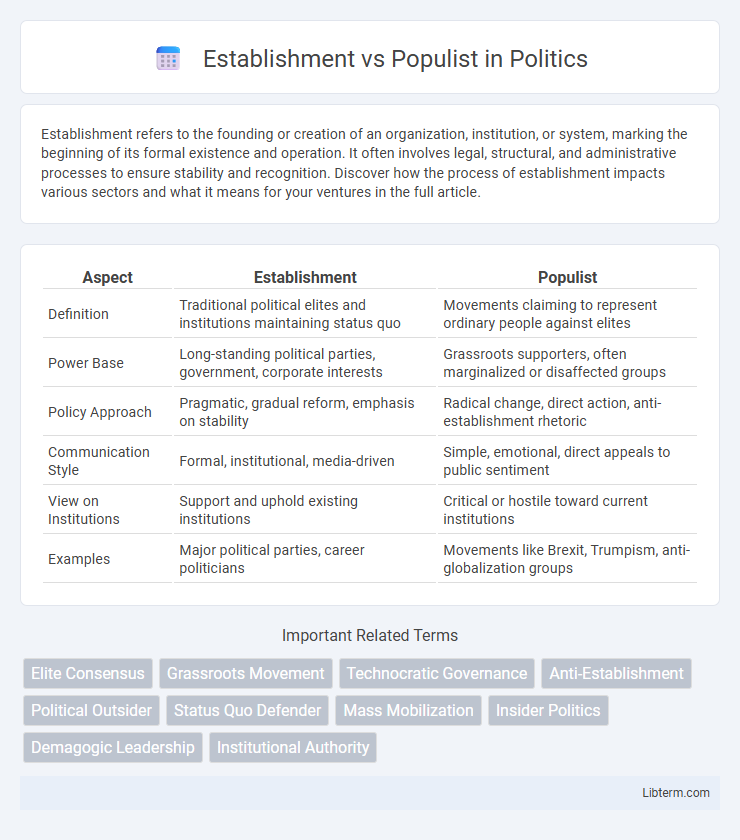Establishment refers to the founding or creation of an organization, institution, or system, marking the beginning of its formal existence and operation. It often involves legal, structural, and administrative processes to ensure stability and recognition. Discover how the process of establishment impacts various sectors and what it means for your ventures in the full article.
Table of Comparison
| Aspect | Establishment | Populist |
|---|---|---|
| Definition | Traditional political elites and institutions maintaining status quo | Movements claiming to represent ordinary people against elites |
| Power Base | Long-standing political parties, government, corporate interests | Grassroots supporters, often marginalized or disaffected groups |
| Policy Approach | Pragmatic, gradual reform, emphasis on stability | Radical change, direct action, anti-establishment rhetoric |
| Communication Style | Formal, institutional, media-driven | Simple, emotional, direct appeals to public sentiment |
| View on Institutions | Support and uphold existing institutions | Critical or hostile toward current institutions |
| Examples | Major political parties, career politicians | Movements like Brexit, Trumpism, anti-globalization groups |
Understanding the Establishment: Definition and Origins
The Establishment refers to a dominant group or elite that holds power and influence within political, economic, and social institutions, often characterized by long-standing authority and control. Its origins trace back to historical power structures where certain families, organizations, or classes consolidated influence to maintain stability and continuity within governance and society. Understanding the Establishment involves recognizing its role in shaping policies, maintaining order, and resisting rapid change to preserve existing hierarchies.
Populism Explained: Key Features and Appeal
Populism centers on championing the interests of ordinary people against perceived elites or establishments, emphasizing direct appeal, anti-elitism, and charismatic leadership. Key features include promoting nationalist rhetoric, skepticism towards traditional institutions, and mobilizing mass support through simplified narratives addressing economic inequality and cultural anxieties. Its appeal lies in resonating with disenfranchised groups who feel ignored by mainstream politics, fostering a sense of empowerment and political engagement.
Historical Evolution: Establishment vs Populist Movements
Establishment politics traditionally revolves around established institutions and mainstream political parties that prioritize stability and continuity, often rooted in long-standing power structures. Populist movements have historically emerged as reactions to perceived elite dominance, championing direct appeals to "the people" and challenging conventional political norms, as seen in episodes like the early 20th-century Progressive movements or the late 20th-century rise of anti-globalization campaigns. The historical evolution reflects cycles where economic crises, social inequalities, or cultural shifts catalyze populist insurgencies that disrupt establishment dominance, sometimes leading to significant political realignments.
Political Ideologies: Core Differences and Similarities
Establishment political ideologies prioritize maintaining traditional power structures, institutional stability, and gradual policy changes, often emphasizing pragmatism and bureaucracy. Populist ideologies focus on representing the "common people" against the elite, advocating for radical reforms, direct democracy, and anti-establishment rhetoric. Both may seek social or economic reform but differ fundamentally in their approach to authority, change, and political inclusion.
Power Dynamics: Who Controls Narrative and Policy?
The power dynamics between the Establishment and Populist movements revolve around control of the narrative and policy-making. The Establishment leverages entrenched institutions, media influence, and political networks to shape public discourse and maintain policy continuity. Populists challenge this by mobilizing grassroots support, utilizing social media platforms, and framing themselves as representatives of the "people" to disrupt traditional power structures and influence policy agendas.
Influence on Elections: Voter Behavior and Mobilization
Establishment candidates often leverage institutional resources and party machinery to influence voter behavior, focusing on traditional campaign strategies and established voter bases. Populist candidates mobilize disenfranchised and apathetic voters by addressing anti-establishment sentiments and emphasizing direct engagement through social media and grassroots movements. This dynamic affects election outcomes by shifting turnout patterns and realigning voter coalitions around issues of trust and representation.
Media Representation: Framing Establishment and Populism
Media representation often frames the Establishment as stable and authoritative, emphasizing experience, tradition, and institutional legitimacy. Populism is typically portrayed through narratives of disruption and anti-elitism, highlighting rhetoric that challenges the status quo and appeals to grassroots sentiments. This framing influences public perception by contrasting the perceived order of the Establishment with the insurgent energy of Populist movements.
Global Impact: Case Studies Across Continents
Populist movements have reshaped political landscapes by challenging entrenched establishment powers and influencing global policy trends, as seen in Brazil's Jair Bolsonaro contrasting with traditional parties, or Hungary's Viktor Orban asserting nationalist agendas against EU norms. These clashes often result in shifts toward protectionism, altered immigration policies, and redefined democratic institutions, evident in the United States during Donald Trump's administration and India's Narendra Modi's tenure. The global impact includes increased polarization, realignment of international alliances, and a reevaluation of governance models across continents.
Challenges and Criticisms: Strengths and Weaknesses
Establishment political groups often face criticism for being disconnected from grassroots concerns, leading to perceptions of elitism and resistance to change. Populist movements leverage strong public support by addressing immediate social and economic grievances, but their reliance on charismatic leadership and oversimplified solutions can result in instability and polarized societies. The establishment's institutional experience provides policy continuity, whereas populists' flexibility in challenging the status quo serves as both a strength and a source of unpredictability.
Future Outlook: Trends and Potential Outcomes
The future outlook for Establishment vs Populist dynamics indicates a growing polarization fueled by digital media and economic disparities. Emerging trends suggest that populist movements may leverage social networks and grassroots campaigns to challenge established political institutions. Potential outcomes include either a reshaping of traditional governance models or increased political fragmentation and instability.
Establishment Infographic

 libterm.com
libterm.com